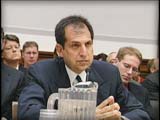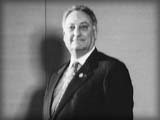 | |
 |  |  |  |  |
|
Here are profiles of the three principal players in the WorldCom-Citigroup story -- Jack Grubman, Bernie Ebbers, and Sandy Weill -- whose interconnected relationships have come to symbolize the conflicts of interest that pervaded Wall Street in the 1990s. |
 |
 |

During the bull market of the 1990s, Salomon Smith Barney telecom
analyst Jack Grubman was notorious for blurring the traditional "Chinese
wall" that was supposed to insulate analysts from investment
banking departments so they could maintain their objectivity. "What used
to be a conflict has now become a synergy," he famously told Business
Week in 2000. "The notion that keeping your distance makes you more
objective is absurd," he continued. "Objective? The other word for it is
uninformed."
| | |

As investors rode the telecom boom of the 1990s, Grubman was
celebrated for his close ties to corporate managers. However, when the bull
market turned bearish -- and Grubman continued to urge investors
to accumulate telecom stocks -- many observers came to question his
motivations. Could an analyst -- so intimately tied to corporate
management that he had attended board meetings of several companies
whose stocks he covered -- provide credible independent advice to
investors?
A math and marketing whiz, Grubman started his career at AT&T in
1977, where he performed strategic planning and economic analysis of
demand in long-distance business. He discovered a mathematical flaw in
AT&T's celebrated computer economic-modeling system, and with his trademark
tenaciousness he convinced the company to stop using it.
In 1985, Grubman moved to PaineWebber, where his experience at
AT&T proved to be a tremendous asset in covering telecoms -- he knew
the industry players and could get access to critical information. At
PaineWebber, where he made nearly $1 million per year, Grubman was known
for working long days and weekends. It was at PaineWebber that Grubman
first met Bernie Ebbers of WorldCom.
Ebbers' strategy of building WorldCom through acquiring regional
rivals closely resembled Grubman's telecom thesis, in which he argued that younger start-up firms could
outperform the industry giants by growing to meet what was expected to
be an explosive demand for networking infrastructure. Grubman served as
an advisor to Ebbers and WorldCom as the company executed larger and
larger deals -- bringing large fees to Salomon Smith Barney, which
underwrote many of the transactions. Grubman advised WorldCom on its 1996
acquisition of MFS Communications, as well as its 1997 merger with MCI,
for which Salomon earned $7.5 million and $32.5 million respectively.
But critics say that the money flowed in both directions. According
to a lawsuit filed by former Salomon Smith Barney broker David
Chacon, Grubman guided a strategy in which his favored telecom
clients would receive shares in hot initial public offerings (IPOs) in
order to win their banking business. The clients would make a windfall
on the IPO allocations, which typically soared in price on the first day
of trading.
As the telecom bubble burst, and with various telecoms engulfed in
scandal, Grubman found himself increasingly under fire from investors --
and under the microscope of regulators, including the Securities and
Exchange Commission (SEC), the National Association of Securities
Dealers (NASD) and New York State Attorney General Eliot Spitzer.
Called to testify before Congress about
WorldCom's bankruptcy in July 2002, Grubman defended his research,
saying he had believed in WorldCom until the company first revealed its
accounting problems. In August 2002, Grubman resigned from Salomon Smith
Barney saying that it was impossible to do his job under a cloud of
suspicion. Grubman received a $30 million severance package and Salomon
Smith Barney agreed to continue to pay his legal bills.
It was after Grubman resigned that he became caught up in another
firestorm -- this time over his November 1999 upgrade of AT&T stock
from a "neutral" to a "buy." Grubman had traditionally been bearish on
his former employer, but his boss, Citigroup CEO Sandy Weill,
asked him to "take a fresh look" at the stock. Weill was a friend of
AT&T Chairman Michael Armstrong, and each man sat on the board of
directors of the other's company.
Shortly after Grubman upgraded AT&T, the company announced it was
spinning off its wireless division, in what would become the largest IPO
in Wall Street history. Salomon Smith Barney was chosen as one of the
underwriters and Citigroup made $63 million on the deal. Six months
later, Grubman downgraded his rating on the stock to "neutral."
The upgrade had been controversial at the time, but Spitzer's
investigators uncovered a bombshell. They discovered an e-mail that
Grubman had sent to a social friend on Jan. 14, 2001, in which he wrote:
You know everyone thinks I upgraded [AT&T] to get lead for
[AT&T Wireless]. Nope. I used Sandy to get my kids in 92nd ST Y
pre-school (which is harder than Harvard) and Sandy needed Armstrong's
vote on our board to nuke Reed in showdown. Once coast was clear for
both of us (ie Sandy clear victor and my kids confirmed) I went back to
my normal negative self on [AT&T]. Armstrong never knew that we both (Sandy
and I) played him like a fiddle.
According to Grubman's e-mail, Weill was motivated by a necessity to
obtain Armstrong's vote in a boardroom battle with Citigroup co-CEO John
Reed, who resigned in February 2000. After the e-mail was leaked to
the press, however, Grubman disavowed it and said he had been showing off to
impress a friend.
However, Spitzer's investigators also discovered a memo from Grubman
to Weill entitled "AT&T and the 92nd Street Y," dated
Nov. 5, 1999, in which Grubman reported back to Weill on a meeting with
Armstrong, and reiterated a request for assistance in gaining the
preschool admission for his children. Although Weill admits that he
asked Grubman to take another look at his position on AT&T, both he
and Grubman deny that there was a quid pro quo. Armstrong also denies
that the stock upgrade had anything to do with his board vote.
In December 2002, Spitzer and the other regulators announced the
terms of a preliminary settlement they had reached with Citigroup and
nine other investment banks. Grubman was banned for life from the
securities industry and ordered to pay a $15 million fine. Although he
is still facing numerous civil suits, Grubman will not face criminal
charges.
 | |  |

As CEO of WorldCom, Ebbers attracted attention for his penchant for
wearing jeans and cowboy boots in business settings, and his passion for
driving his tractor around his brother's soybean and cattle farm.
Ebbers' career before WorldCom took a meandering path -- he started as a
milkman and bouncer before becoming a high school basketball coach and
then manager of a motel chain.
| | |

In 1982, Ebbers, along with Bill Fields, David Singleton and Murray
Waldron, saw a golden opportunity, with the breakup of AT&T, to sell
cheap long-distance service. The group sketched out the details of their
business, named LDDS for "Long Distance Discount Service," at a coffee
shop in Hattiesburg, Miss., and obtained a $650,000 loan from a local
bank to buy a computer switch to route long-distance calls. Because
AT&T was under court order to lease its phone lines cheaply to
start-up companies, LDDS was able to offer cut rates to small
businesses.
At first, Ebbers was merely an investor in LDDS. However, two years
later, with the company in debt, Ebbers was named president, and he
instituted the growth strategy for which the company would become known
-- the purchase of its regional rivals, using LDDS stock as currency. Within
10 years, LDDS had purchased 30 companies and its sales reached nearly
$1 billion. The company was renamed WorldCom in 1995.
Along with many in the telecom industry, Ebbers believed that the
Internet age would lead to insatiable demand for fiberoptic networks and
bandwidth. He aggressively pursued his growth strategy throughout the
1990s, all the while focused on relentless cost-cutting within his
ever-growing company.
In 1997, WorldCom shocked the business world when it launched an
unsolicited bid for MCI, which had been close to merging with British
Telecom. With the merger, MCI WorldCom became the second largest U.S.
long-distance company.
Two years later, WorldCom and Sprint announced plans to merge, but
the deal was scuttled by regulators, and marked the end of
WorldCom's major acquisitions binge. By this time, long-distance prices
were plummeting and the telecom bubble had produced a glut of
overcapacity. Some telecom analysts warned investors to sell their
telecom stocks -- including WorldCom.
However, one important analyst maintained a "buy" rating as WorldCom
shares continuously lost value. Throughout WorldCom's meteoric rise,
Ebbers and his board of directors were advised by Salomon Smith Barney telecom
analyst Jack Grubman. Grubman attended three meetings of WorldCom's
board and was listed as a financial adviser on the
WorldCom-MCI deal.
According to former Salomon Smith Barney broker David Chacon,
Ebbers profited personally from his relationship with Grubman. Chacon
alleges in a lawsuit that Grubman's strategy of "spinning" IPO shares to
win over banking business from Salomon clients proved very lucrative for
Ebbers. Although Salomon told Congress that Ebbers made $11 million off
21 IPOs, Chacon says that he made much more than that in one IPO alone.
According to Chacon's lawsuit, Ebbers received 350,000 shares in the April
1999 IPO of a company called Rhythms NetConnections -- and made $16
million off the deal. Salomon Smith Barney disputes the lawsuit.
Salomon Smith Barney earned roughly $140 million from WorldCom over
four years. In May 2001 and again in May 2002, with WorldCom desperate for cash and its stock price declining, Citigroup, Salomon's parent company, sold investors
$17 billion in WorldCom bonds, limiting its own exposure from loans to
the company -- and to Ebbers personally.
Over the years, Ebbers had accumulated a private business empire,
which included a luxury yacht named Aquasitions, a lumber mill, a ranch
in Canada and a half million acres of timberland across Mississippi,
Tennessee, and Alabama. Records of the 1999 timberlands purchase show
that a $499 million loan, later folded into a billion dollar mortgage, was arranged by Travelers, a
Citigroup subsidiary, and backed by WorldCom stock. Critics argue that
Citigroup should have disclosed its interest in keeping WorldCom shares
high in order to guarantee the loans, and note that Grubman kept a "buy"
rating on the stock, even as shares were plummeting.
In addition to his Citigroup loans, Ebbers received hundreds of
millions of dollars in loans from WorldCom itself. In late 2000, Bank of
America, which had also granted Ebbers loans backed by WorldCom stock as
collateral, threatened him with a margin call, which would have
forced him to sell shares to pay back the loan. WorldCom
guaranteed the loan in order to avoid Ebbers selling off a large number
of its shares and damaging its stock price.
Ebbers was forced to resign from WorldCom in April 2002 amid an SEC inquiry into
both his corporate loans and WorldCom's accounting practices. At the
time of his resignation, he owed $343 million to the company. He is
currently living on his 2100-acre estate.
 | |  |

The Brooklyn-born son of Polish immigrants, Sandy Weill's first
job on Wall Street was as a stock runner for Bear Stearns. A legendary
deal-maker, renowned as the Street's dominant banker, Weill has also
been reviled (and in some quarters admired) as an imperial boss and a
ruthless cost-cutter.
| | |

In the early 1960s, Weill and three partners, including future SEC
Chairman Arthur Levitt, opened a small Wall Street research firm
named Cogan, Berlind, Weill and Levitt (disparagingly known on Wall
Street as "Corned Beef with Lettuce"). CBWL established itself in the
1970s through mergers and acquisitions with several prestigious
brokerage houses, including Hayden Stone, Shearson Hamill, and Loeb
Rhoades. The firm, renamed Shearson Loeb Rhoades, became the second
largest brokerage firm in the U.S.
Weill made what turned out to be a disastrous move in 1980, when he
sold Shearson Loeb Rhoades to American Express for nearly $1 billion. He
soon clashed with American Express' corporate style and chafed as second-in-command under CEO John Robinson. Frustrated, he quit in 1985, at age
58, and failed in a subsequent attempt to take over Bank of America the same year.
Weill's comeback began the following year, when he became CEO of a
consumer-loan company called Commercial Credit. Again he built his new
company through a series of mergers and acquisitions that were followed
by ruthless cost-cutting. He acquired Primerica, which included the
Smith Barney brokerage firm, in 1988, and the Travelers insurance
company in 1993. The following year his company, renamed Travelers,
bought Shearson back from American Express for $1 billion and in 1997 he
purchased the Salomon Brothers brokerage firm and combined it with Smith
Barney to form Salomon Smith Barney.
Weill's crowning glory, however, was merging Travelers with Citicorp
in 1998 to create Citigroup, the largest financial institution in the
world. The superbank combined one of the largest insurance companies
(Travelers), one of the largest investment banks (Salomon Smith Barney),
and one of the largest commercial banks (Citibank) in America. Weill and
Citibank CEO John Reed became co-CEOs of Citigroup, a stormy arrangement
that lasted until early 2000, when Reed stepped down after losing a power struggle to Weill.
The only thing standing in the way of Weill's superbank was the 1933
Glass-Steagall Act, which prevented commercial banks from selling
securities. So Weill took his case to Washington to convince the Federal Reserve to approve the merger and
persuade Congress to repeal Glass-Steagall (which it had attempted to do several
times in the previous decade and for which support was growing). He
privately lobbied Fed Chairman Alan Greenspan, Treasury Secretary Robert
Rubin, and President Bill Clinton for their support. In September 1998,
the Fed agreed to give temporary approval for Weill to operate his
superbank for two years, and Congress repealed Glass-Steagall in
November 1999.
Citigroup, like many Wall Street investment firms, found itself under
fire when the 1990s bull market turned bearish. Regulators began
investigating Salomon Smith Barney analyst Jack Grubman for
conflicts of interest and for his alleged involvement in "spinning" IPO
allocations to the personal accounts of corporate banking clients to win
further business. The firm was under attack from shareholders, who filed
lawsuits accusing Citigroup of not performing due diligence before it
became involved in WorldCom's May 2001 and 2002 bond offerings.
Perhaps most damaging, however, was when Weill personally became a target of
New York Attorney General Eliot Spitzer's investigation into Wall Street
practices. Weill admitted to having asked Grubman to "take a
fresh look" at AT&T before Grubman raised his rating in November
1999. However, he denied giving Grubman a direct order to upgrade the stock
and insisted the reason behind his request was his firm belief in the
company. Weill did direct a $1 million request to the 92nd
Street Y, where Grubman was trying to enter his children in its exclusive preschool, but denies that it had any connection to Grubman's
upgrade.
In August 2002, with Citigroup under increasing scrutiny, Weill
announced that the firm would enact a series of voluntary reforms,
including new regulations to maintain the "Chinese wall" between the
research and investment banking departments, and requiring analysts to
formally certify their reports to ensure that they "accurately reflect
their personal views." In the wake of criticism for Citigroup's role in
structuring Enron's off-the-books corporate entities, the firm also said
it would not participate in structuring such deals unless the
corporations involved fully disclosed them on their balance sheets. And
to mollify corporate governance critics, Citibank promised to expense
stock options on its income statements. Weill withdrew his nomination to
the board of the New York Stock Exchange in March, after critics,
including Eliot Spitzer, protested vigorously.
In the April 2003 final settlement between Citigroup and regulators, Weill was barred from
talking to his firm's research analysts without a company lawyer
present. Spitzer agreed not to pursue criminal charges against Weill or
the firm, which agreed to pay $400 million in penalties, disgorgement of
profits, and other payments.
| |
 |
|
home » introduction » worldcom » fixing the street? » washington » interviews
discussion » producer's chat
tapes & transcripts » press reaction » credits » privacy policy
FRONTLINE » wgbh » pbsi
published may 8, 2003
web site copyright WGBH educational foundation
|
|